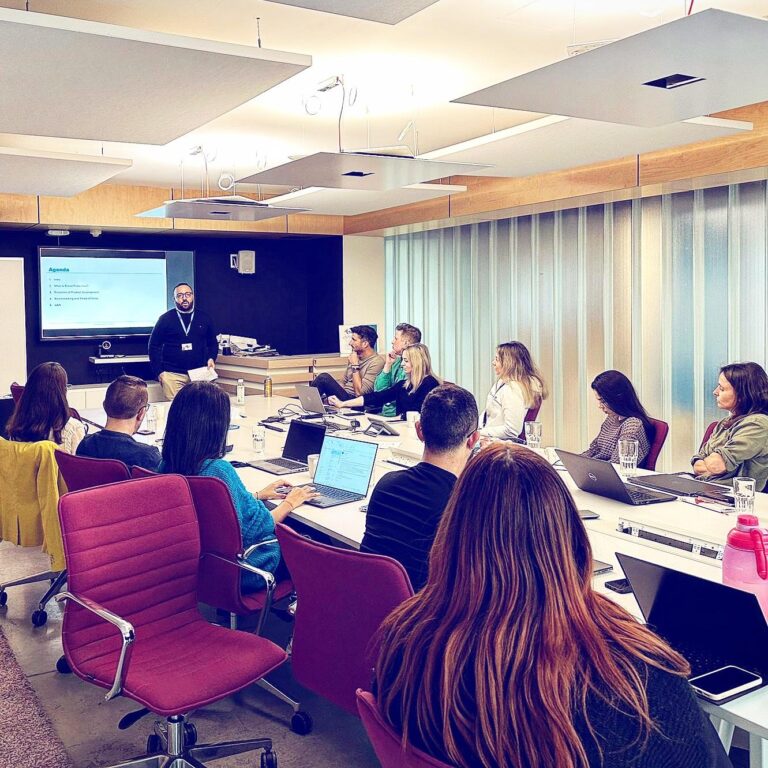Andrea Motta moderates the panel: 'Busting SEO Myths: Unveiling Google's True Ranking Factors'

Table of Contents
Ta’ Xbiex, March 12, 2024 – Andrea Motta, a seasoned SEO Consultant with global reach, had the pleasure of moderating an engaging panel at Betsson Group headquarters in Malta, as part of the SEO Lab series.
The focus of the discussion, which involved all members of Betsson Group’s SEO team, both those based in Malta and external consultants who flew to the heart of the Mediterranean for the occasion, was to explore the following theme: “Busting SEO Myths: Unveiling Google’s True Ranking Factors.“
During the session, core topics in the SEO universe were explored, such as E-E-A-T and Core Web Vitals, in addition to discussing methods for evaluating the ROI of SEO campaigns, communicating the importance of SEO initiatives to stakeholders, and managing priorities regarding SEO issues in a large company, where careful planning of actions is often necessary.
Among the panellists, all seasoned SEO experts, were Eddy Van der Mast (Senior SEO Brand Owner), Silvia Tavella (Global Onsite SEO Lead), and Olga Taylor (SEO Brand Owner), who travelled from Brighton, UK, where she lives, to participate in the discussion at Betsson Group headquarters in Ta’ Xbiex.
But let’s take a closer look at the topics discussed.

E-E-A-T: Ranking Factor or Just Guidelines?
“E-E-AT” stands for Experience, Expertise, Authoritativeness, and Trustworthiness. While many sources argue that E-E-A-T itself is not a direct ranking factor, Google’s quality raters consider the principles of E-E-A-T when assessing how well a site or page provides what users need.
Google’s algorithm, after all, aims to provide users with the most relevant and reliable information. Websites and content that demonstrate expertise in their field, have authority within their industry or niche, and are perceived as trustworthy by users are more likely to achieve high rankings in search engines.
Factors contributing to E-E-A-T include:
- Experience – indicates the extent to which the content creator has necessary direct experience or life experience on the topic.
- Expertise – content created by individuals or organizations with expertise in the field is often rated more positively. This can be demonstrated through the qualifications, experience, and knowledge of content creators.
- Authority – websites or content considered authoritative in their field, often supported by strong backlink profiles from authoritative sources, tend to achieve better rankings in search engines.
- Trustworthiness – this aspect is evaluated by factors such as the accuracy of the information provided, transparency about the source of information, security measures (e.g., SSL encryption), and user reviews or ratings.
The panelists confirmed that, although E-E-A-T itself is not a direct ranking factor, focusing on these aspects can improve the overall quality and credibility of a website or content, positively influencing search engine optimization performance.

Are Core Web Vitals considered ranking factors or not?
- CWV stands for Core Web Vitals, a set of specific factors related to the user experience of a web page. Google, on the other hand, has repeatedly confirmed that Core Web Vitals have become a consideration for quality raters, although not being a ranking factor per se. Specifically, CWVs measure aspects of web page performance, such as loading speed, interactivity, and visual stability, which directly impact user experience.
In detail, Core Web Vitals include:
- Largest Contentful Paint (LCP) – this metric measures loading performance and focuses specifically on how quickly the largest content element of a page loads. Google considers a good LCP to be less than 2.5 seconds.
- First Input Delay (FID) – FID measures interactivity and quantifies a page’s responsiveness. It evaluates the time it takes for a page to become interactive for users. Google considers a good FID to be less than 100 milliseconds.
- Cumulative Layout Shift (CLS) – CLS measures visual stability and evaluates how much page content shifts during loading. It is important for providing a smooth and predictable user experience. Google considers a CLS score less than 0.1 as good.
According to the panellists, focusing on improving Core Web Vitals can help enhance the user experience of your website, potentially leading to better rankings, especially if your site is otherwise comparable to others in terms of relevance and authority.

Redefining SEO: Emphasizing ROI over Positioning
During the panel, the latest topic addressed was how to best engage corporate stakeholders in SEO matters, redefining priorities based on their impact on the business.
While traditional metrics, such as ranking for relevant keywords to the business, offer useful analysis of a website’s performance, they often fail to fully capture the financial impact of SEO strategies, which, ultimately, is what matters most to corporate leaders. This shift in perspective allows companies to bridge the gap between SEO strategies and broader business objectives, unlocking new opportunities for growth and profit.
Indeed, at the heart of every business activity lies the ability to generate revenue and ensure sustainable profitability. Within the realm of SEO, this principle remains paramount. While achieving high rankings and increased visibility are important, it’s essential to translate these efforts into tangible ROI results. In other words, non-SEO company directors are money-oriented and do not care about most of them would see as vanity metrics; they have the need to understand how SEO investments directly translate into profits.
After all, recalibrating SEO priorities with a focus on campaign ROI allows stakeholders to better grasp the financial value that SEO brings to the company. By highlighting the direct link between SEO and revenue generation, companies can better convey to top management how SEO investments directly influence profits. This contributes to greater engagement from executives as they recognise the crucial role of SEO in ensuring sustainable business growth.
Moreover, as discussed in the panel, focusing SEO priorities on campaign ROI enables stakeholders to make more informed decisions about resource allocation and strategic investments. Prioritising initiatives that have the potential to positively impact ROI allows companies to optimise their SEO strategies for the best financial outcomes.
In summary, panellists agreed that redirecting SEO priorities with a focus on campaign ROI represents a fundamental shift in companies’ approach to SEO strategy and execution. By aligning SEO efforts with the goal of maximising ROI, companies can unlock new growth opportunities, gain a competitive edge, and drive business success in the digital age, giving SEO its true value.
If you wish to invite me to your events or conferences, just fill out a contact form or send me an email at [email protected]. Looking forward to chat!
